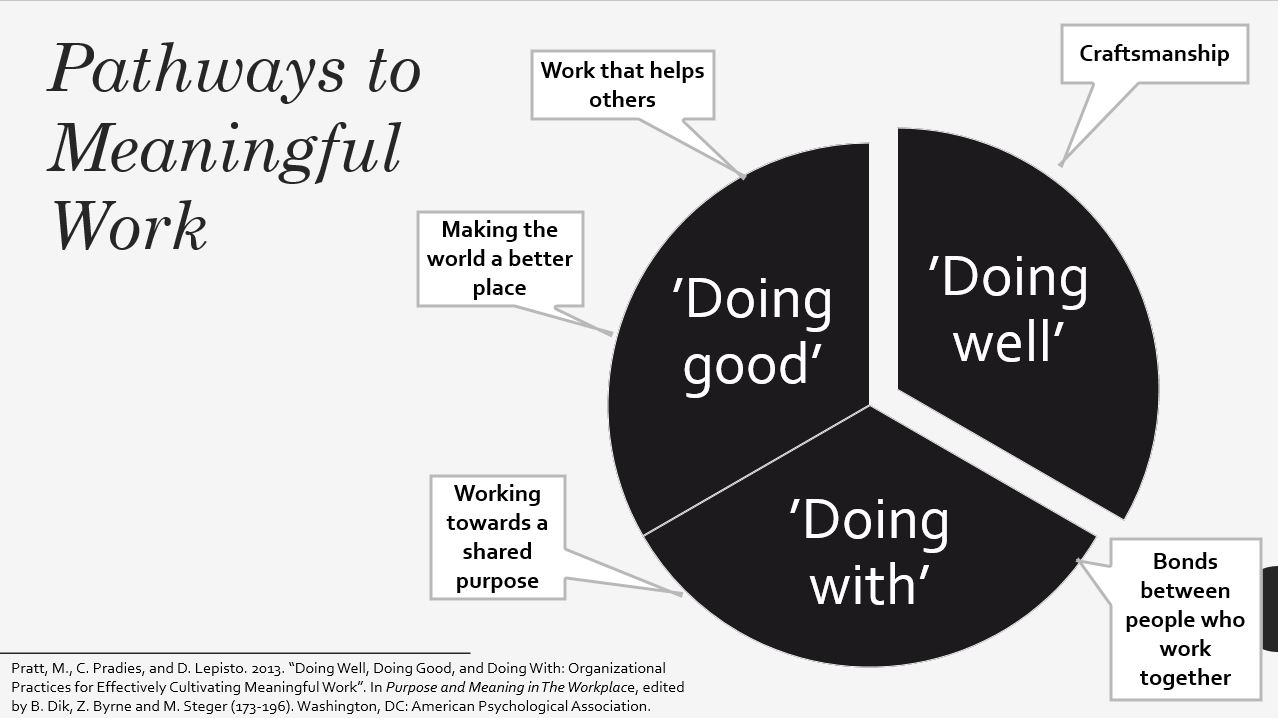Research into meaningful sport is not well established, and it is often useful to look into other fields for inspiration and ideas. Meaningful work is one such field, with a large body of literature accumulated in the past two decades. From here, we can find numerous accounts of the ‘ingredients’ of meaningful work, which we can try to link to our understandings of sport.

Pratt, Pradies, and Lepisto (2013) proposed three distinct (independent) pathways to meaningful work. We might find our jobs worthwhile because it helps others or makes the world somehow a better place (‘doing good’). Some others could find meaning from working together and value the bonds we create with others through work (‘doing with’). And finally, some of us might be craftsmen (or craftswomen) who desire to do develop our skill and do our jobs well for its own sake (‘doing well’).

‘Doing good’: In a sports context, I have interviewed some (often more mature) athletes who have a strong desire to share their knowledge, aspire to be role models, and are strongly involved in the politics of their sport. Through their visibility, some elite athletes could be trying to advance causes they believe in, and in that case sport can be a vehicle for ‘greater good’. However, I also often hear that athletes reflect on sport as a selfish activity and how they have prioritised their own needs and success over others’ need. There is no necessary way in which sport makes the world better – although it could.
‘Doing with’: Almost all retired team sport athletes who I’ve interviewed in my research have talked about the bonding between the teammates and how the locker room life is unique. Injured ice hockey players in one of our studies told us that the loss of connection with the teammates was the worst part of the injury experience. Sport, like any social activity, can bring people together, and sport has the advantage that few words are necessary. When living in China, I often did sports with people with whom we had limited means of verbal communication. We could still run or play ultimate frisbee together – and feel that we connect.
‘Doing well’: This is the craftsmanship approach which I personally view as probably the most promising pathway to meaningful sport. In our recent study, craftsmanship was a predictor of higher level of meaning in sport, and other studies are showing a similar promise. Sennett’s influential book The Craftsman (2008) describes craftsmanship as “the special human condition of being engaged” (p. 20), and as an enduring human desire to things well ‘for its own sake’. I will write a lot more about craftsmanship in this blog later on, but for now I also wanted to emphasise its value for our sporting lives especially when team sports (and ‘doing with’) are on hold in many parts of the world.
I believe these can be all relevant, and sometimes at the same time, for meaningful sport. At the same time, I believe certain sports have something else that is not included here. When doing our sport in the nature, we can have the glimpses of fusion with the universe, a special way of resonating with the world, of disappearance of the self. Some call it spirituality, others something else. The running philosopher George Sheehan wrote in his book Running and Being: The Total Experience that running provided him a “proof of the existence of God”.
And I am sure there will be other ways that sport shows up as meaningful to us. We just have to find ways to verbalise them.
Further reading:
Pratt, M., Pradies, C., & Lepisto, D. (2013). Doing well, doing good, and doing with: Organizational practices for effectively cultivating meaningful work. In B. Dik, Z. Byrne & M. Steger (Eds.), Purpose and meaning in the workplace (pp. 173-196). Washington, DC: American Psychological Association.
You must log in to post a comment.